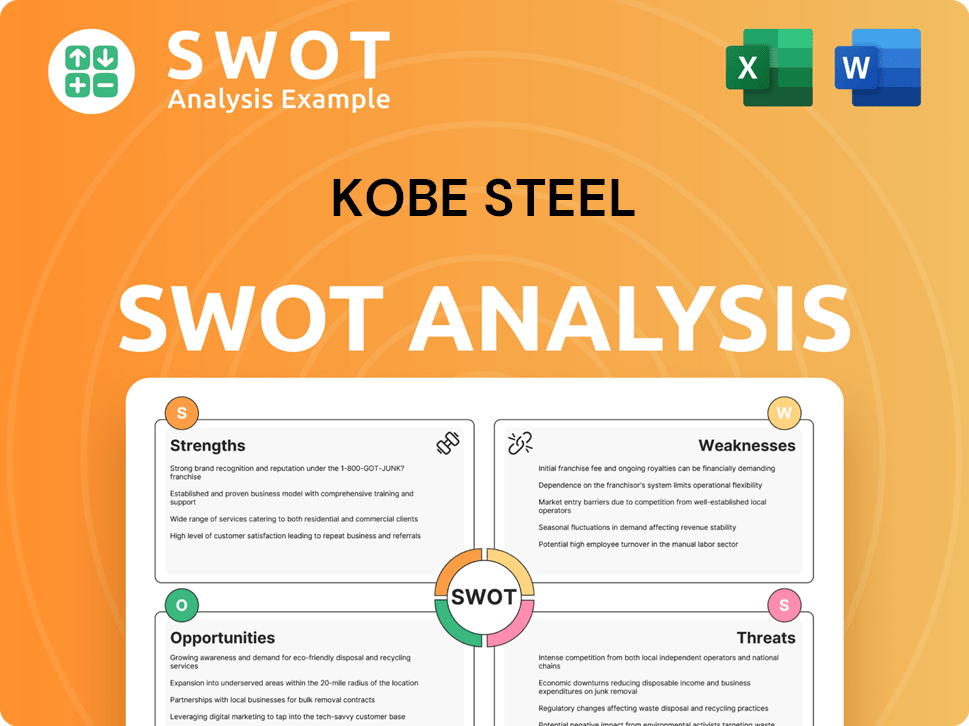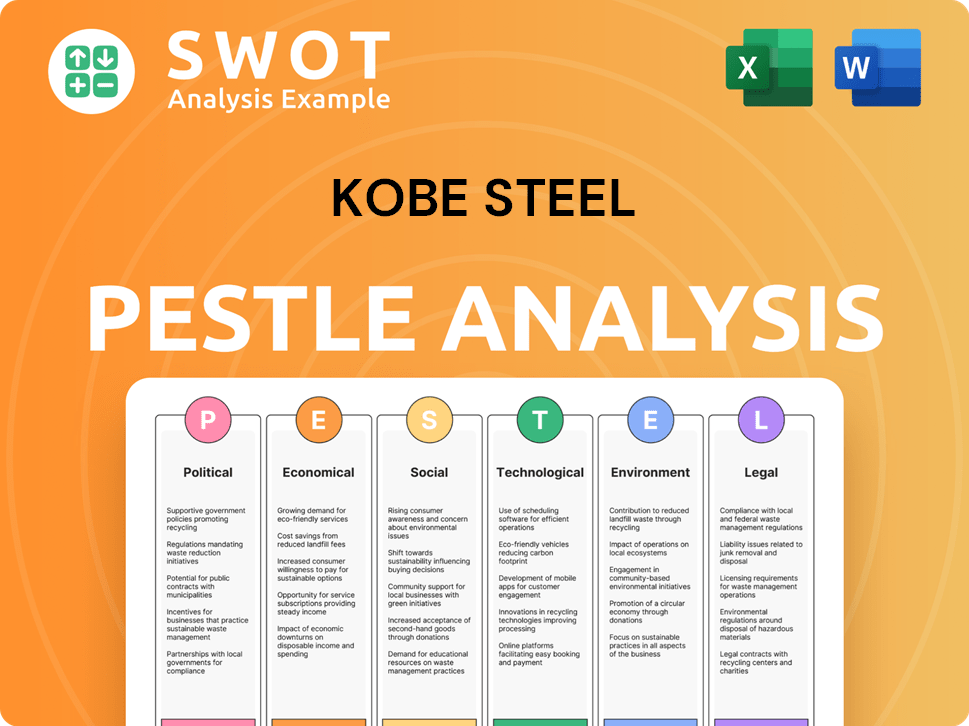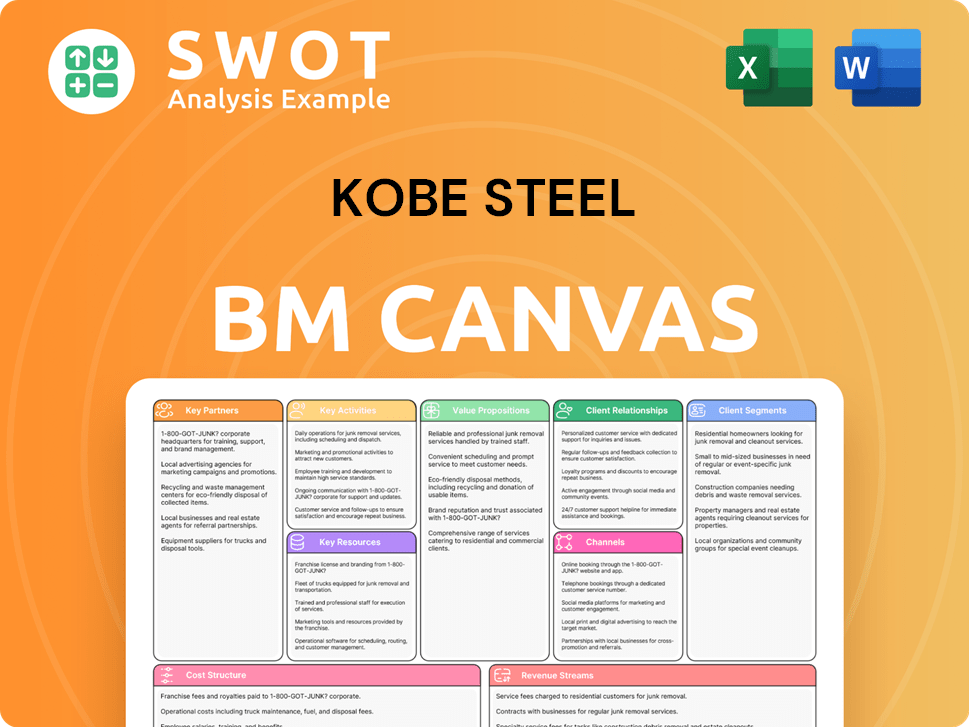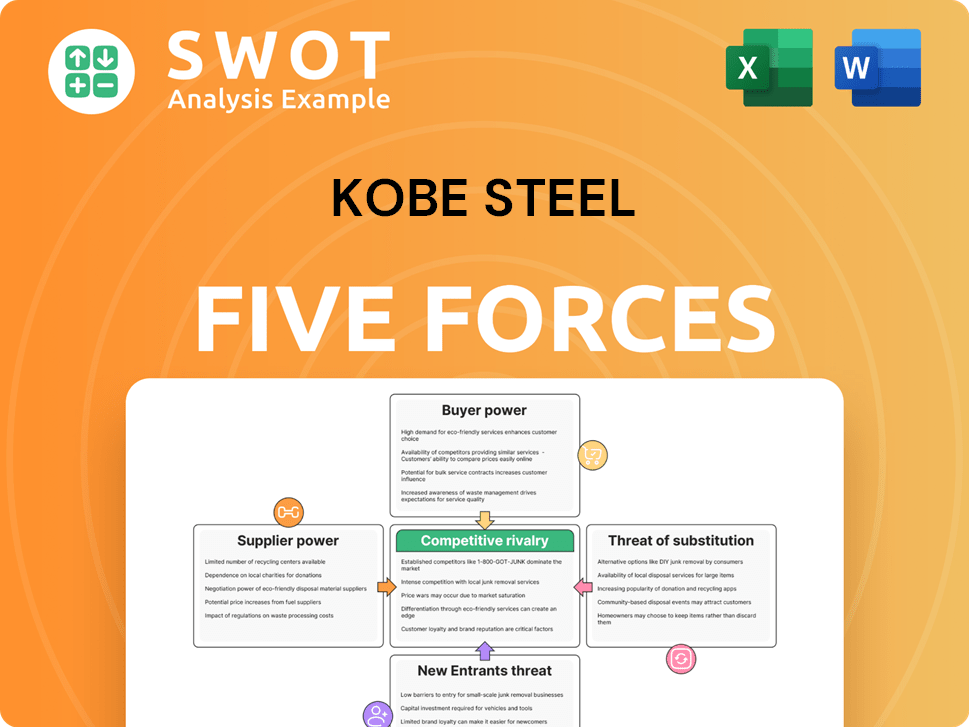Kobe Steel Bundle
How Well Does Kobe Steel Understand Its Customers?
In the ever-changing world of manufacturing, understanding your customer is key, and for Kobe Steel, a company with over a century of experience, this is especially true. From its beginnings in steel to its current diversified portfolio, Kobe Steel's success hinges on its ability to identify and cater to its target market. This deep dive explores the vital link between Kobe Steel's customer demographics and its strategic business decisions.

Kobe Steel's Kobe Steel SWOT Analysis reveals crucial insights into its customer base and industry focus. The company's strategic pivot towards sustainable materials, such as green aluminum, exemplifies its responsiveness to evolving customer needs, particularly within the automotive sector. Analyzing the company's customer demographics, from age to geographic location, is essential to understanding its market share and future growth potential. This exploration provides a comprehensive Kobe Steel market analysis.
Who Are Kobe Steel’s Main Customers?
Understanding the customer demographics of Kobe Steel involves recognizing its business-to-business (B2B) model. Unlike companies that directly sell to consumers, Kobe Steel focuses on serving other businesses. This means its target market is defined by the industries it supplies, rather than individual consumer profiles.
The Kobe Steel customer profile is primarily composed of businesses across various sectors. These sectors include automotive, construction, energy, machinery manufacturing, shipbuilding, and the IT/semiconductor industries. The company tailors its products and services to meet the specific needs of each of these segments.
Kobe Steel's customer segmentation strategies are centered around industry-specific requirements. For instance, the automotive industry receives flat-rolled steel, aluminum products, and welding materials. The construction sector utilizes steel pipes, tubes, and construction machinery. The energy sector, including nuclear power, relies on Kobe Steel for equipment and engineering solutions. These segments are crucial for the company's revenue generation.
Kobe Steel provides materials like flat-rolled steel and aluminum products. The demand for lightweight materials is increasing due to the growth of electric vehicles (EVs). The company has partnerships, such as with Nissan, to address this need.
Steel pipes, tubes, and construction machinery like hydraulic excavators are supplied. This sector relies on Kobe Steel for essential materials and equipment for infrastructure projects.
Kobe Steel offers equipment and engineering solutions, including for nuclear power plants. This sector depends on the company for specialized products.
Kobe Steel designs and produces a wide range of industrial machinery. This segment is a significant source of income for the company.
The Kobe Steel customer base is defined by the need for high-quality, reliable, and often specialized materials and machinery. The company's focus on research and development is critical to meeting the evolving needs of these customers. The Growth Strategy of Kobe Steel highlights the company's commitment to innovation.
- Industry Focus: Primary customers are businesses in automotive, construction, energy, machinery manufacturing, shipbuilding, and IT/semiconductor sectors.
- Product Needs: Customers require high-quality materials, machinery, and engineering solutions tailored to their specific industry needs.
- R&D Investment: In fiscal year 2024, Kobe Steel invested JPY 23,422 million on R&D, representing 0.9% of its revenue.
- Future Outlook: The machinery segment is expected to see increased earnings in fiscal year 2025.
Kobe Steel SWOT Analysis
- Complete SWOT Breakdown
- Fully Customizable
- Editable in Excel & Word
- Professional Formatting
- Investor-Ready Format

What Do Kobe Steel’s Customers Want?
Understanding the customer needs and preferences is crucial for Kobe Steel's success. The company's business-to-business (B2B) model requires a deep understanding of its clients' specific requirements, which vary across industries. These needs go beyond just the materials themselves, encompassing quality, reliability, innovation, and sustainability.
Kobe Steel's customer base is diverse, spanning sectors like automotive, construction, energy, and machinery. Each industry has unique demands. For instance, the automotive industry seeks lightweight materials like aluminum to boost fuel efficiency and support the shift to electric vehicles. The construction sector prioritizes high-quality, safe materials to ensure structural integrity.
The company's customer profile is characterized by a focus on performance, cost-effectiveness, and long-term operational benefits. Kobe Steel's ability to deliver tailored solutions and maintain strong partnerships is key to retaining and expanding its customer base. The company’s commitment to research and development, with an investment of JPY 23,422 million in FY2024, shows its dedication to meeting evolving customer needs.
Across industries, Kobe Steel's customers emphasize high-quality standards and safety. This is especially critical in sectors like construction and energy, where product failures can have severe financial and safety consequences. Kobe Steel's reputation for producing high-quality steel products is a key factor in its customer relationships.
Customers value technological advancements and innovative solutions. Kobe Steel's investments in research and development are directly aimed at creating technologies that meet evolving customer needs. The company's focus on innovation helps it address customer pain points and offer competitive advantages.
Sustainability is increasingly important to customers. Kobe Steel addresses this by providing green aluminum materials to major automakers. This aligns with the growing demand for environmentally friendly products and supports the transition to more sustainable practices within its customer base.
Customers seek tailored solutions that meet their specific needs. Kobe Steel customizes its offerings, such as its KOBEMAG steel sheets, to meet specific customer demands. This approach enhances customer satisfaction and strengthens relationships.
Customer loyalty is fostered through strong partnerships built on trust and mutual success. Kobe Steel has established strategic alliances with suppliers, distributors, and research institutions to ensure a steady supply of raw materials and maintain high-quality standards.
Customers always consider the impact on their production efficiency and long-term operational costs. Kobe Steel's materials and machinery are designed to improve efficiency and reduce costs. The company's 'asset-light strategies' in fiscal 2025 aim to improve financial stability, which can contribute to more reliable operations and customer service.
Kobe Steel's customer base is driven by a complex set of needs and preferences. These include a focus on product performance, safety, and cost-effectiveness. The company’s ability to provide tailored solutions, foster strong partnerships, and invest in innovation is essential for meeting these needs.
- Quality and Reliability: Customers prioritize high-quality products that meet stringent safety standards, especially in critical industries.
- Technological Innovation: Customers seek advanced materials and technologies that enhance their production processes and product performance.
- Sustainability: There is a growing demand for environmentally friendly products and sustainable practices.
- Customization: Tailored solutions that meet specific industry and application requirements are highly valued.
- Cost Efficiency: Customers are focused on materials and machinery that improve production efficiency and reduce long-term operational costs.
- Strong Partnerships: Building trust and mutual success through strategic alliances and reliable service is crucial.
Kobe Steel PESTLE Analysis
- Covers All 6 PESTLE Categories
- No Research Needed – Save Hours of Work
- Built by Experts, Trusted by Consultants
- Instant Download, Ready to Use
- 100% Editable, Fully Customizable

Where does Kobe Steel operate?
The geographical market presence of Kobe Steel is extensive, extending far beyond its home country of Japan. The company strategically operates globally, establishing subsidiaries and joint ventures in numerous countries to effectively penetrate international markets. This widespread presence allows the company to cater to diverse customer needs and market demands across different regions.
As of March 31, 2024, Kobe Steel had a global footprint spanning across 23 countries. This broad international reach is a key element of Kobe Steel's strategy, allowing it to diversify its revenue streams and mitigate risks associated with relying solely on the domestic market. The company's ability to adapt and localize its operations is crucial for its success in these varied markets.
Major markets for Kobe Steel include Japan, North America, China, and other Asian countries. In Japan, Kobe Steel reported steel domestic sales of 3.63 million metric tons in fiscal year 2024-25. Its steel exports rose by 4.8% to 1.09 million metric tons in the same period, indicating strong international demand. This demonstrates the company's strong position in both domestic and international markets.
In its domestic market, Japan, Kobe Steel reported steel domestic sales of 3.63 million metric tons in fiscal year 2024-25. This highlights the importance of the Japanese market for the company's overall sales and revenue. The company's strong presence in Japan is a cornerstone of its business.
Kobe Steel's steel exports rose by 4.8% to 1.09 million metric tons in fiscal year 2024-25. This increase demonstrates the company's ability to compete in the global market and meet the demands of international customers. This growth is a positive sign for the company's future.
In China, Kobe Steel is bolstering its automotive aluminum panel business through a collaborative effort with China Baowu Steel Group. This is in response to the growing demand for electric vehicles (EVs) in that region. The joint venture aims to establish local production to meet the increasing need for local consumption.
In North America, the company is addressing the growing need for local production and consumption by restructuring its aluminum advanced materials business to improve profitability. This strategic move reflects the company's commitment to adapting to market needs and enhancing its competitiveness.
Kobe Steel actively tailors its offerings and strategies to succeed in diverse markets. For instance, in China, the company is focusing on its automotive aluminum panel business through a joint venture with China Baowu Steel Group, aligning with the rising demand for electric vehicles (EVs). This collaboration aims to establish local production to meet increasing local consumption needs. Similarly, in North America, the company is restructuring its aluminum advanced materials business to improve profitability, addressing the growing need for local production and consumption. Kobe Steel also seeks to strengthen its production and sales systems in Asia to meet regional demands. The welding segment also focuses on overseas sales volume. To learn more about the company's financial structure, consider reading about the Revenue Streams & Business Model of Kobe Steel.
Kobe Steel Business Model Canvas
- Complete 9-Block Business Model Canvas
- Effortlessly Communicate Your Business Strategy
- Investor-Ready BMC Format
- 100% Editable and Customizable
- Clear and Structured Layout

How Does Kobe Steel Win & Keep Customers?
Kobe Steel's approach to customer acquisition and retention is deeply rooted in its business-to-business (B2B) model. This strategy prioritizes long-term partnerships and technological leadership. Their diverse portfolio, spanning steel, aluminum, copper, and various industrial sectors, enables them to offer comprehensive solutions. This approach facilitates both attracting and retaining a broad customer base, reflecting a strategic focus on meeting industry-specific needs and building lasting relationships.
The company's customer acquisition strategy heavily relies on strategic alliances and joint ventures. These collaborations enable Kobe Steel to penetrate new markets and expand its product offerings effectively. For instance, their partnership with China Baowu Steel Group for automotive aluminum panels is a clear move to capture business in the rapidly expanding EV market in China. This proactive stance showcases their commitment to growth and adaptability within the automotive industry, directly acquiring new business in a high-growth sector.
Customer retention is achieved through continuous innovation and tailoring products to evolving customer demands. Kobe Steel invests significantly in research and development to develop advanced technologies and improve product quality, ensuring its offerings remain competitive and relevant. The company's emphasis on providing reliable and safe products, as highlighted in its mission, fosters trust and long-term relationships.
Strategic alliances and joint ventures are key to expanding market reach. The partnership with China Baowu Steel Group is a prime example, focusing on the growing EV market. This approach allows for direct acquisition of new business in high-growth sectors, reflecting a proactive market strategy.
Kobe Steel invests heavily in research and development. Their R&D spending in FY2024 was JPY 23,422 million. This investment ensures the development of advanced technologies and product quality improvements, keeping offerings competitive and relevant for their Kobe Steel customer profile.
The company's focus on providing reliable and safe products is crucial for customer retention. This emphasis builds trust and fosters long-term relationships within the B2B model. Quality assurance is a cornerstone of their strategy.
Kobe Steel integrates sustainability into its operations, as detailed in its 2024 Integrated Report. This approach appeals to environmentally conscious customers. This strategy helps retain customers who share similar environmental goals, strengthening customer loyalty.
Kobe Steel strategically targets key industries like automotive and construction. Their partnerships and product developments are tailored to meet specific industry demands. This focused approach enhances their ability to serve the needs of their
The company adapts its products to meet evolving customer needs. This includes developing green aluminum materials for automotive manufacturers. This flexibility ensures that Kobe Steel remains a relevant and valuable partner for its customers.
'Asset-light strategies' for fiscal 2025 are designed to enhance financial stability. This indirectly supports customer confidence by ensuring consistent supply and service. This financial approach is crucial for long-term customer relationships.
Continuous investment in research and development (R&D) is a core strategy. This ensures the development of advanced technologies and product quality improvements. This focus on innovation helps to retain customers by providing cutting-edge solutions.
Kobe Steel emphasizes building long-term relationships with its clients. This approach, combined with quality products and services, fosters trust. This focus on enduring partnerships helps maintain a stable and loyal customer base.
Their commitment to sustainability, as highlighted in their 2024 Integrated Report, also serves as a retention strategy. This appeals to customers with similar environmental goals, strengthening the bonds and promoting long-term loyalty.
Kobe Steel Porter's Five Forces Analysis
- Covers All 5 Competitive Forces in Detail
- Structured for Consultants, Students, and Founders
- 100% Editable in Microsoft Word & Excel
- Instant Digital Download – Use Immediately
- Compatible with Mac & PC – Fully Unlocked

Related Blogs
- What are Mission Vision & Core Values of Kobe Steel Company?
- What is Competitive Landscape of Kobe Steel Company?
- What is Growth Strategy and Future Prospects of Kobe Steel Company?
- How Does Kobe Steel Company Work?
- What is Sales and Marketing Strategy of Kobe Steel Company?
- What is Brief History of Kobe Steel Company?
- Who Owns Kobe Steel Company?
Disclaimer
All information, articles, and product details provided on this website are for general informational and educational purposes only. We do not claim any ownership over, nor do we intend to infringe upon, any trademarks, copyrights, logos, brand names, or other intellectual property mentioned or depicted on this site. Such intellectual property remains the property of its respective owners, and any references here are made solely for identification or informational purposes, without implying any affiliation, endorsement, or partnership.
We make no representations or warranties, express or implied, regarding the accuracy, completeness, or suitability of any content or products presented. Nothing on this website should be construed as legal, tax, investment, financial, medical, or other professional advice. In addition, no part of this site—including articles or product references—constitutes a solicitation, recommendation, endorsement, advertisement, or offer to buy or sell any securities, franchises, or other financial instruments, particularly in jurisdictions where such activity would be unlawful.
All content is of a general nature and may not address the specific circumstances of any individual or entity. It is not a substitute for professional advice or services. Any actions you take based on the information provided here are strictly at your own risk. You accept full responsibility for any decisions or outcomes arising from your use of this website and agree to release us from any liability in connection with your use of, or reliance upon, the content or products found herein.